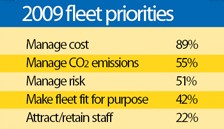Companies are switching focus away from a human resources approach on fleet management to a strategy of managing and cutting costs.
Earlier this year, PricewaterhouseCoopers revealed that 89% of companies now consider managing fleet costs to be a priority, while only 22% said recruitment and retention was a major consideration.
Its Monks Company Car 2009 report found that while fleet strategy is still primarily driven by the HR department, cost management is increasingly coming under the finance department’s responsibility.
Finance directors are now largely dictating policy with fleet managers reporting that they are under immense pressure to cut costs.However, this becomes an opportunity to demonstrate their value to the company, according to Mark Sinclair, director of Alphabet (GB).
“Fleet managers need to seize the opportunity to be proactive and add value to reduce costs,” Sinclair said.
“The balance of power has shifted from the driver.
“Now it’s all about reducing costs, not staff retention.”
Stewart Whyte, managing director of Fleet Audits, believes fleets could easily realise savings of five to 15% by taking a close look at costs.
“If fleet managers don’t keep a lid on costs then they will only rise,” he said.
Savings can equate to millions of pounds by buying the right vehicles (British Airways has cut its fleet carbon footprint by a third by taking on Honda Civic hybrids), reducing accident rates (Network Rail has cut accidents by 30% by adopting a zero tolerance attitude), minimising mileage (Campbell’s Prime Meats has seen a 15% fall in fuel costs thanks to tracking) and ensuring staff drive in an efficient and safe manner.
However, fleets believe that most company drivers are not adhering to efficient driving practices, even when they have been through training.
A show of hands at the recent Fleet News Green Summit, in association with the Energy Saving Trust, revealed that just two of the 60 fleets present were confident that their employees were driving in an efficient manner.
Broadcaster Quentin Willson, who chaired the conference, said he was “shocked” at the finding.
“Given that you can save 10-20% off fuel bills by progressive driving, it’s crazy not to do it,” he told Fleet News.
“I’m completely shocked that the sort of thing that I thought large bodies of people in the fleet industry take for granted is not in fact being practised at all.”
2009 fleet priorities
- Manage cost 89%
- Manage CO2 emissions 55%
- Manage risk 51%
- Make fleet fit for purpose 42%
- Attract/retain staff 22%
Source: PWC Monks














Login to comment
Comments
No comments have been made yet.